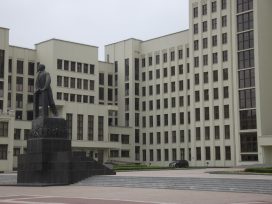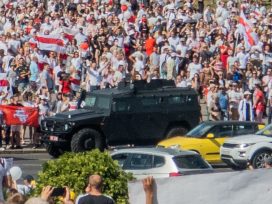The language that waited at the doorstep
A constrained mother tongue is resilient in recalled memory. Those who no longer speak Belarusian tenderly piece together often painful cultural threads, processing trauma to keep their ‘mova’ alive.
[Welsh version added]
Languages’ similarities are not rooted in a special genetics for language. They follow from culture and common information-processing solutions and have their own individual evolutionary stories.
Daniel Everett, How Languages Began
Nothing great can be expressed in Belarusian, it is a poor language. There are only two great languages in the world – Russian and English.
Aleksandr Lukashenka, President of Belarus
As a child, a three-month stay in a village in Polesia turned me into a Belarusian speaker. Back in Minsk, with its gladiolus spears, sandpaper-rough school uniforms and my classmates’ foul-mouthed newspeak, I did manage to surprise friends with my trasianka – a mixture of Belarusian and Russian – for a while.1 But the Belarusian soon slipped away, like sand through a sieve. It went back where it came from – into the earth. Russian always won. Though, in truth, what kind of Russian was it in those Soviet days? A language of school primers, political slogans, songs about ‘friendship between peoples’, the Mother-Rodina and the Great Patriotic War fought by our forefathers – all redolent of wishful thinking, enforced forgetting, cultural annihilation.
Away from the Polesian village, I would occasionally hear Belarusian from my father. He would switch to his mother-tongue during alcoholic creative phases, when he allowed himself to dream of becoming a writer, slipping into mova2 in the company of authors, whose autographs he proudly displayed in a beautifully maintained collection. Mova would come stumbling into our apartment after midnight, as drunk as the family’s almost-writer, tripping over the doorstep, hurting itself against the armrest in the hallway, once, getting stuck in the bathroom, unable to figure out how to unlock the door.
Speaking mova made my father feel more like a writer, bearing fragments of unfinished debates, jokes, and stories about the past and future of the country and its culture. The link formed in early childhood between Belarusian and the creative process was so strong that even now, when I hear someone speak beautiful high-Belarusian, I instinctively expect them to hand me down a modest book of poetry or a collection of short stories. Mova is all about aspiration and ambition – though I’ve heard frequent warnings against confusing the two.
My mother never seemed much affected by father’s artistic ambitions or his monologues. I cannot remember ever hearing her speak Belarusian. Dad’s second wife was also Russian-speaking. She was in fact, quite simply, Russian with her picturesque stacks of buttery blini, litres of tea, and a glass-fronted bookshelf displaying Russian classics in their spacious zal.3
‘“Zal” is the seating area of a theatre, Olya. The proper word is “bolshaya komnata” (the big room),’ she would say, correcting me in her didactic tone and reminding that – in the world of Russian language and culture – I was not native.
She treated Belarusian words like sweets from a dodgy, back-alley factory. She would examine the wrapper politely and might even keep one in her mouth for a moment, but then she’d spit it out as something foreign. Though, in my father’s eyes, mova was the language of writers, his new Russian wife never found a place for it in her ‘big room’. Mova was permitted only as far as the threshold, where it was left cooling its heels, waiting for slippers that fit – very much like me, frequently introduced as the ‘daughter from a first marriage’ to cultured guests over those Russian pancakes.
After visiting the world of ‘big rooms’, with its Volgas of tea and Hermitages of blini, I always longed to return to ‘the earth’. In my Polesie village, no one cared what language you spoke. My grandmother could neither read nor write – in her old Soviet passport, a cross served as her signature. But what a good listener she was!
And my mother? Her family was ‘multicultural’, as people would say nowadays. Some of her relatives came from Tambov – something my father incessantly joked about, reminding everyone of the popular expression ‘a Tambov wolf is your comrade’ (a sarcastic way of rebuffing a false show of camaraderie), dropping hints about who was in cahoots with whom.4 Another part of Mum’s family was originally from the ever-shifting border of Western Belarus. What language did her father speak? I’ve no idea. Grandpa Stanislav was a slow, old man with the beery-sounding surname Kozel, meaning ‘billy goat’, which my mother inherited as her maiden name (a fact my father also liked to mock). My grandfather was ill with cancer by the time I met him, shuffling like an exhausted steam engine down the hallway of a tiny apartment in Stolbtsy, coughing, smoking, and coughing again as he sank deeper into the inner horizon of a silent past. It took me decades to discover the terrifying details of his early life, so common to the darker side of Soviet history.
His father, Ivan Frantsevich, was arrested on 23 August 1937, following an anonymous denunciation (as I discovered after a long night of research in my current place of exile, Berlin). Two months later, the 31-year-old man was executed in Slutsk prison. His card in the Memorial archives states that an anonymous Stalinist troika found him guilty under Articles 72 and 74 of the Belarusian Soviet Socialist Republic’s Criminal Code: ‘Agitation or propaganda containing calls to overthrow the government’. The verdict was delivered in Russian, the language which my classmates and I would use half a century later to sing songs about peace, friendship between peoples, the Motherland and the Great Patriotic War fought by our forefathers.
It seems absurd that a father of four young children, with no more than a basic education, should have been charged with preparing a coup. But the Soviet administration functioned according to a logic of its own. Any suspicious biographical fact could cost your freedom. Extraordinary as it may seem, a hundred years before I was born, Ivan had crossed the ocean on the British passenger liner Aquitania. He had also seen the symbol of freedom which Belarusians still dream about today: the Statue of Liberty. That alone was enough for his Motherland to view him as a spy when he returned home.
A few days before my great-grandfather’s execution, more than a hundred members of the Belarusian intelligentsia had shared the same fate. They were hastily buried in the Kurapaty forest near Minsk and, to this day, their bodies remain there without posthumous recognition, marking the beginning of the ethnocide of an entire culture and language. Little by little mova disappeared from our schools, newspapers, theaters and books, cementing the status of a single language – Russian – for over two generations. Following the 2020 protests, which launched new waves of repression, many of the country’s last remaining Belarusian speakers left for Ukraine, Poland, Georgia or Germany. Those who stayed settled for survival tactics used during the fascist occupation of the 1940s and went ‘underground’.
‘I want to believe that people will not accept colonization in silence,’ says a friend who, until recently, lived in Minsk. ‘Some people still speak Belarusian on a daily basis. Sadly, I’m not one of them – but I try to say kali laska (please) and dziakuj (thank you) in shops and banks. Complete strangers often give me warm smiles in response. To some this may seem trivial, perhaps even strange. How can you possibly be afraid to speak your own native tongue? But it’s important. It’s my resistance, my quiet, personal contribution to the battle against ongoing Russification.’
Does silence have its own language, I wonder? And if it does, what is it? Is it that of benumbed Russians, lost to resurrected, wooden Soviet propaganda – forever young, forever courageous, forever successful in replacing the grim realities of Dostoevsky’s world with a cheery ‘paradiZe’?5 Or is it mova, lodged in the memories of a rural childhood, that once so very nearly made it in the city, academia, world-wide, that spurred my father’s dream of becoming a writer – before the empire of ‘comrades’ tamed him, before he stopped speaking to me in any language at all, before my grandmother (who could neither read nor write, but knew how to listen better than all of us put together) passed away, before Belarusians started getting arrested at the border as they returned from Europe for family funerals, before books in mova were declared extremist, before we realized that history does repeat itself, as Karl Marx wrote, first as tragedy then as farce?
Trasianka is colloquial speech in Belarus that merges the Belarusian and Russian languages. It is characterized by Belarusian vocabulary and pronunciation, although some words are of Russian origin. It is commonly used in rural areas or among speakers who are not entirely fluent in either standard language. Trasianka emerged as a result of Soviet-era language policy, urbanization, and widespread Russian dominance in education and the media, all of which led many Belarusian speakers to develop a hybrid mode of communication.
Mova (мова) – noun. 1. (neutral) The word for ‘language’ in Belarusian and Ukrainian; 2. (cultural/political) A symbol of national identity, cultural resilience, and resistance to assimilation or Russification. In Belarus, the phrase ‘размаўляць па-беларуску’ (‘to speak Belarusian’) may reflect a political position or denote a deeply personal decision. It is often associated with more than just use of the language.
In Belarusian Russian, the word zal (зал) is commonly used to refer to the largest room in an apartment, which would typically be called the living room or sitting room in standard Russian. This usage stems from Soviet-era housing terminology and is reinforced by the Belarusian word zala (зала), which also means ‘hall’ or ‘large room’. Though not standard, zal remains a widely understood and culturally rooted expression in today’s Belarus.
The phrase ‘a Tambov wolf is your comrade’ may originate form the Tambov Rebellion in 1921, when the Soviets killed between 30,000 and 50,000 local people following large-scale rioting against the Bolsheviks. The military operation was led by Mikhail Tukhachevsky, who urged his subordinates to conduct it ‘with elation and inspiration’. The rebellion was suppressed by taking family members of rebels as hostages, the destruction of entire villages, the creation of concentration camps where children were kept alongside adults, and mass executions. More than 450 of the hostages taken were under the age of 10. In military reports on the outcomes of the operation, local people were referred to as ‘dissenting human material’. The expression ‘Tambov wolves’ entered the vocabulary of the Soviet Union to designate rebellious, criminal outcasts.
Since 2022, the letter ‘Z’ from the Roman alphabet has been used by the Russian government and pro-war supporters as a symbol of loyalty to the Kremlin’s full-scale invasion of Ukraine. Though it has no direct meaning in the Cyrillic alphabet, it often appears on military vehicles and has quickly become a propagandistic emblem, widely displayed in public spaces, schools and media to signal nationalistic fervour and ideological conformity. A frequent use is in the slogan Za Победу! (For victory!).
Published 14 July 2025
Original in English
First published by Eurozine
Contributed by Institute for Human Sciences (IWM) © Olga Bubich / Institute for Human Sciences (IWM) / Eurozine
PDF/PRINTIn collaboration with
In focal points
Newsletter
Subscribe to know what’s worth thinking about.
Related Articles

Political failures after independence allowed Belarusian society to become captive to the pro-Russian state. As Lukashenka enters his seventh term, five years after crushing the peaceful revolution, what lessons can the opposition take?

Russian art museums and galleries, navigating Putin’s censorship, either conform or risk closure. Dissenting cultural workers are sacked, artists arrested. Pro-war propaganda is both sardonically replacing exhibitions once celebrating Soviet Ukraine in Russia and eradicating Ukrainian culture in the occupied territories.






